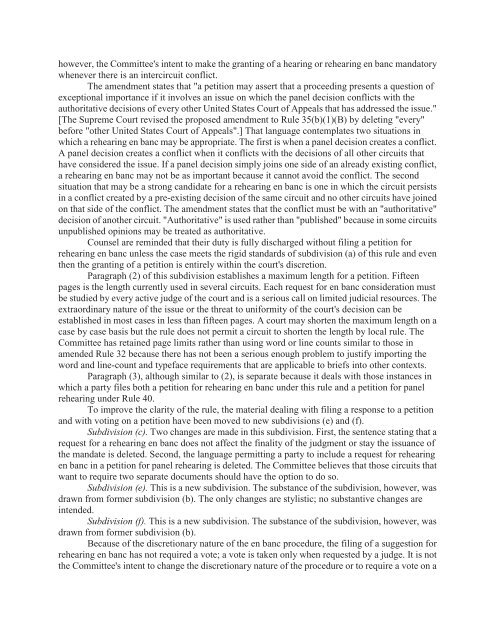Federal Rules of Appellate Procedure 2014-2015, 2014a
Federal Rules of Appellate Procedure 2014-2015, 2014a
Federal Rules of Appellate Procedure 2014-2015, 2014a
You also want an ePaper? Increase the reach of your titles
YUMPU automatically turns print PDFs into web optimized ePapers that Google loves.
however, the Committee's intent to make the granting <strong>of</strong> a hearing or rehearing en banc mandatory<br />
whenever there is an intercircuit conflict.<br />
The amendment states that "a petition may assert that a proceeding presents a question <strong>of</strong><br />
exceptional importance if it involves an issue on which the panel decision conflicts with the<br />
authoritative decisions <strong>of</strong> every other United States Court <strong>of</strong> Appeals that has addressed the issue."<br />
[The Supreme Court revised the proposed amendment to Rule 35(b)(1)(B) by deleting "every"<br />
before "other United States Court <strong>of</strong> Appeals".] That language contemplates two situations in<br />
which a rehearing en banc may be appropriate. The first is when a panel decision creates a conflict.<br />
A panel decision creates a conflict when it conflicts with the decisions <strong>of</strong> all other circuits that<br />
have considered the issue. If a panel decision simply joins one side <strong>of</strong> an already existing conflict,<br />
a rehearing en banc may not be as important because it cannot avoid the conflict. The second<br />
situation that may be a strong candidate for a rehearing en banc is one in which the circuit persists<br />
in a conflict created by a pre-existing decision <strong>of</strong> the same circuit and no other circuits have joined<br />
on that side <strong>of</strong> the conflict. The amendment states that the conflict must be with an "authoritative"<br />
decision <strong>of</strong> another circuit. "Authoritative" is used rather than "published" because in some circuits<br />
unpublished opinions may be treated as authoritative.<br />
Counsel are reminded that their duty is fully discharged without filing a petition for<br />
rehearing en banc unless the case meets the rigid standards <strong>of</strong> subdivision (a) <strong>of</strong> this rule and even<br />
then the granting <strong>of</strong> a petition is entirely within the court's discretion.<br />
Paragraph (2) <strong>of</strong> this subdivision establishes a maximum length for a petition. Fifteen<br />
pages is the length currently used in several circuits. Each request for en banc consideration must<br />
be studied by every active judge <strong>of</strong> the court and is a serious call on limited judicial resources. The<br />
extraordinary nature <strong>of</strong> the issue or the threat to uniformity <strong>of</strong> the court's decision can be<br />
established in most cases in less than fifteen pages. A court may shorten the maximum length on a<br />
case by case basis but the rule does not permit a circuit to shorten the length by local rule. The<br />
Committee has retained page limits rather than using word or line counts similar to those in<br />
amended Rule 32 because there has not been a serious enough problem to justify importing the<br />
word and line-count and typeface requirements that are applicable to briefs into other contexts.<br />
Paragraph (3), although similar to (2), is separate because it deals with those instances in<br />
which a party files both a petition for rehearing en banc under this rule and a petition for panel<br />
rehearing under Rule 40.<br />
To improve the clarity <strong>of</strong> the rule, the material dealing with filing a response to a petition<br />
and with voting on a petition have been moved to new subdivisions (e) and (f).<br />
Subdivision (c). Two changes are made in this subdivision. First, the sentence stating that a<br />
request for a rehearing en banc does not affect the finality <strong>of</strong> the judgment or stay the issuance <strong>of</strong><br />
the mandate is deleted. Second, the language permitting a party to include a request for rehearing<br />
en banc in a petition for panel rehearing is deleted. The Committee believes that those circuits that<br />
want to require two separate documents should have the option to do so.<br />
Subdivision (e). This is a new subdivision. The substance <strong>of</strong> the subdivision, however, was<br />
drawn from former subdivision (b). The only changes are stylistic; no substantive changes are<br />
intended.<br />
Subdivision (f). This is a new subdivision. The substance <strong>of</strong> the subdivision, however, was<br />
drawn from former subdivision (b).<br />
Because <strong>of</strong> the discretionary nature <strong>of</strong> the en banc procedure, the filing <strong>of</strong> a suggestion for<br />
rehearing en banc has not required a vote; a vote is taken only when requested by a judge. It is not<br />
the Committee's intent to change the discretionary nature <strong>of</strong> the procedure or to require a vote on a


















